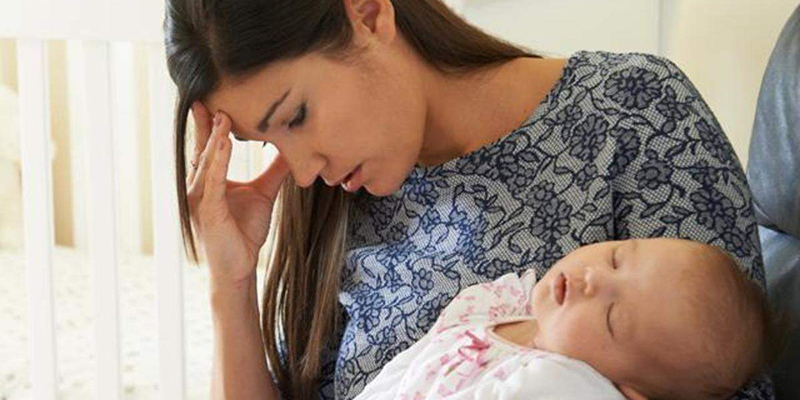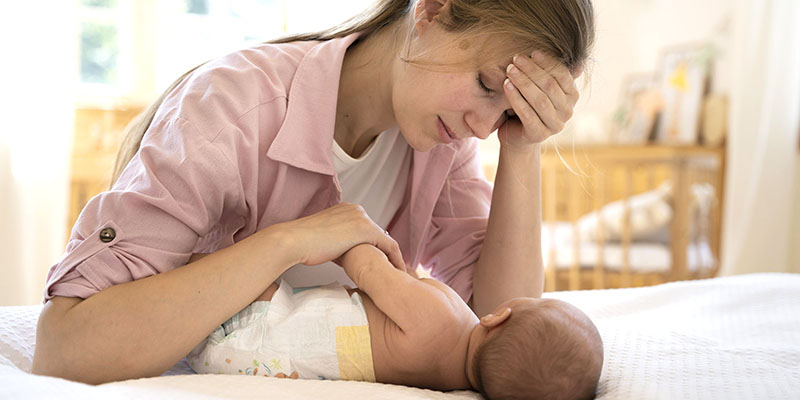
Postpartum Mental Health: A Guide to Recognizing and Managing PPD
 Mother & baby
Mother & baby Mental health is as important as the body, and even more during such a life-changing transition into motherhood. So many new mothers are found to be suffering from PPD, yet more often than not, it goes undiagnosed or untreated. Understanding the signs and symptoms of PPD is important, not only for your own sake but also for your baby's healthy growth.
Mental health is as essential as the body, even more so during such a life-changing transition into motherhood. So many new mothers are found to be suffering from PPD, yet more often than not, it goes undiagnosed or untreated. Understanding the signs and symptoms of PPD is essential, not only for your own sake but also for your baby's healthy growth.

All will go more easily with this significant change in your life if you take care of your mental health, and you will get on with your baby so much quicker.
Navigating The Postpartum Journey: The Importance Of Mental Well-Being
The postpartum period introduces many changes, often with feelings of joy, challenges, and significant readjustments. Caring for a newborn monopolizes most life activities, but one should remember the new mother. Good postpartum mental well-being is essential for the health of both the mother and her baby.
Understanding The Emotional Roller Coaster
Many emotions may rise after birth due to hormonal and new life responsibilities. Mood swings, anxiety, and fatigue are normal. However, when feeling sad, hopeless, and failing to attach to your baby could be pointing toward a more serious condition that is commonly referred to as postpartum depression.
Recognizing The Signs
First things first: find help by recognizing the signs of PPD. The following should raise a red flag:
• Deep sadness or emptiness
• Not feeling bonded with the baby.
• Feeling fatigued or a loss of energy
• Severe mood swings
Establishing Your Support System
A sound support system can be crucial during this vulnerable time. So, lean on your partner, family, or friends, or join support groups. Do not hesitate to express your feelings and ask for help whenever needed. Requesting assistance is, in fact, a sign of strength and not weakness.
Diagnosing The Symptoms Of Postpartum Depression
The earlier it gets identified, the better the possibility of timely intervention and support. It is expected to have ups and downs after childbirth, but it is persistence that may point toward PPD. Key signs to watch out for include:
Emotional Changes
New mothers experience PPD by feeling sad, anxious, or even experiencing mood swings that last for a period exceeding two weeks. Feeling overwhelmed or hopeless is typical, as is difficulty bonding with a new baby. Others feel irritable, angry, or feel less worthy.
Changes In Behaviour
Changes in sleep, appetite, and energy are warning signs of PPD. Others may lose interest in activities that once pleased them or avoid friends and family. Others may need help making decisions or performing usual tasks.
Physical Symptoms
Physical symptoms include unexplained aches, headaches, and digestive problems. Still, other women experience diminished or increased appetites. Some mothers may feel extraordinarily fatigued yet are unable to sleep or do not feel rested after a good deal of sleep.

Thoughts Of Self-Harm
On more profound levels, PPD may involve self-injurious behaviours or harm to the baby. These are serious considerations that involve immediate medical intervention. Note that such thoughts do not make a person a bad parent; this is a symptom of a curable illness.
Coping Strategies For Mothers Suffering From PPD
Seek Professional Help
In these cases, professional help should be sought if these symptoms of PPD tend to get overwhelmingly unbearable. They will diagnose one properly and suggest treatment, which may come in therapy, medication, or sometimes both. To reiterate, this is something to be regarded as seeking help is a strength, not a weakness.
Self-Care
Take the time to do things that help your body and mind recharge. For many mothers, this may mean sleeping when they can, eating foods that help them have energy, and doing light exercise when they are up to it. Ask for help with childcare so you can have time to take care of yourself.
Mindfulness And Relaxation Techniques
Engage in de-stressing techniques like deep breathing, meditation, or Yoga. Indeed, these tips work when one needs to reduce anxiety and bring a sense of calmness. Even a few minutes of daily mindfulness can make all the difference in mood and general Stress levels.
Setting Realistic Expectations
Be easy on yourself and lower your expectations about these difficult times. Everything does not have to be perfect. Give yourself two or three realistic objectives daily and focus on small achievements.
Professional Help: How To Reach Out For Resources Regarding Your Mental Health?
Any woman with PPD must seek professional help. The first consult should be with your obstetrician or primary care physician. They will screen you first and refer you to mental health professionals who specialize in the treatment of PPD. A psychiatrist, psychologist, and therapist specializing in perinatal mental health will give you treatment options.
Considering Your Treatment Options
Treatment options for PPD most often involve both psychotherapy and medication. Cognitive-behavioral therapy (CBT) and interpersonal therapy (IPT) are two therapies that work well for PPD. You will learn to recognize negative thoughts and function better by developing coping mechanisms. In some cases, anti-depressant medications may be effective. You and your healthcare provider will discuss your symptoms and your status related to breastfeeding to decide upon the best therapeutic approach.
Community Resources
Most communities have support groups for new mothers who are suffering from PPD. These groups help people have an avenue to talk about their situations and share ways of coping with others who understand their problems. Such meetings occur in local hospitals, community centres, and online.
Practical Self-Care Strategies
Start with small, manageable steps. Get adequate rest whenever possible, even if it means napping when your baby sleeps. Maintain a balanced diet rich in nutrients to support your physical and mental health. Regular gentle exercise, like short walks with your baby, can boost your mood and energy levels.
Mindfulness And Relaxation Techniques
Light exercises, such as deep breathing, meditation, or simple Yoga, should be included in the routine. These will reduce Stress, improve sleep quality, and generally improve people's moods in this transition phase.
Supportive Care For Mental Health In New Mothers
A new mom and her family should be aware of how to handle issues related to postpartum depression. You are going to take an active step in knowing its signs and symptoms to help yourself or anyone you love get the help they need with PPD. Reaching out for help is not a sign of weakness; it is one of strength. Most women recover entirely with the proper treatment and support.
